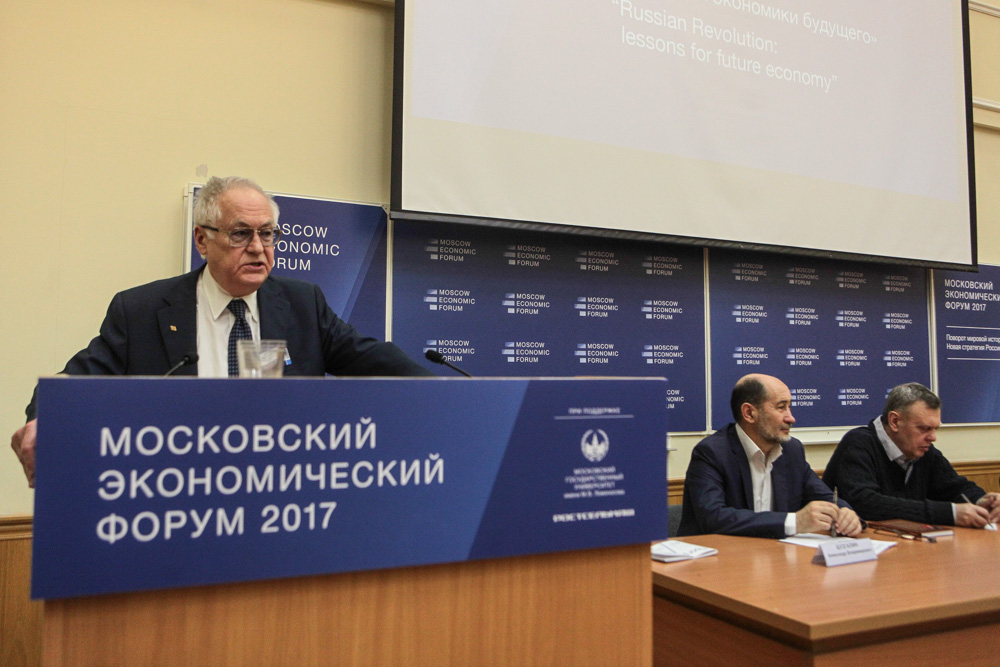
Published: March 30th, 2017
On March 30, within the framework of the Moscow Economic Forum (MEF), the Round Table "The Russian Revolution: Lessons for the Future Economy" was held. The moderator of the discussion was the deputy co-chairman of the forum, professor of the economic faculty of Moscow State University named after M.V. Lomonosov Alexander Buzgalin.
The panel was attended by expert of the Rosa Luxemburg Foundation Lutz Brangsh, Senior Research Fellow of the Institute of Philosophy of the Ministry of Science, Technology and Environment of Cuba Jesus Brigos, Head of the Rosa Luxemburg Foundation in Russia Kerstin Kaiser, Academician of the Russian Academy of Sciences Robert Nigmaulin, PhD in Philosophy Roman Osin.
The first speaker was the professor of the University of Havana Garcia Jesús Brigos. According to him, Cuba always turned to Soviet experience and learned a number of lessons from it: the need for the development of the theory, as well as the inextricable link between the political regime and the development of the economy. Specifically, for Cuba, the external context is extremely important, because it has a decisive influence on the economy.
The head of the Moscow office of the Rosa Luxemburg Foundation, Kerstin Kaiser, touched upon both the economic aspects of socialism and the issues of equality of men and women in her report. The main idea of the speaker was the rethinking of the concept of democracy. "I am sure that without democracy there can not be socialism," Kerstin said, "without it sustainable development is impossible.
Academician of the Russian Academy of Sciences Robert Nigmatulin noted that the theme of the revolution is undeservedly ignored in the mass media. This applies not only to the century of the great Russian revolution, but also to the events of the 1990s. The Speaker specifically warned the opposition: "Power is always bad, but as a result of the revolution, even worse rulers often comes. A revolution is a disaster," he summed up. Nigmatulin called on the authorities to respond to challenges, especially those coming from youth. The suppression of the rallies on March 26 demonstrated that the authorities are ignoring them now. "The authorities should not prohibit demonstrations, do not drive them into some forests, where no one will see them, but talk to them," the academician summed up.
Candidate of Philosophy Roman Osin expressed confidence that socialism and the market economy are incompatible, and all talk about social partnership and socially responsible business only camouflages the contradictions between labor and capital. Social benefits, existing in Europe, the speaker considers an achievement of a powerful labor movement. He is sure that it is possible and necessary to fight for social partnership, and it is not worth to be afraid of revolutions as a means of such a struggle.
Andrei Sorokin, executive secretary of the journal “Alternatives”, drew the attention of those gathered to the price of renouncing the revolution, which often serves as an inevitable solution to the problems that have arisen in society. "If we did not have a revolution in 1917, most likely, Russia would have become not the birthplace of socialism, but the birthplace of fascism. Because it was necessary to find the answers to those transformations, to those needs of society. If they had not found it on the left side of the story, they would have found it on the right," the publicist noted. The speaker expressed concern about the Russian society's desire for isolation. He is sure that the absence of bright leaders in the left opposition can sooner or later cause a powerful recreational response that will prove more dangerous than the revolution.
Concluding the discussion, Andrei Buzgalin noted the nonlinearity of the revolution and the processes it generates, as well as the possibility and reality of peaceful revolutionary scenarios. He stressed that the revolution that began in Russia has become worldwide, and a series of attempts to create a new society around the world has not stopped until now.Latest news
07.05.2018 MEF-2018: debate "Cultural policy: between individual freedom and the interests of society?"
07.05.2018 MEF-2018: Conference No. 8
07.05.2018 MEF-2018: Conference No. 4
07.05.2018 MEF-2018: Conference No.3
07.05.2018 MEF-2018: Conference No. 2
07.05.2018 MEF-2018: Conference No.1
26.04.2018 McConnell Discusses Information Warfare
20.04.2018 MEF-2018: closing plenary session
17.04.2018 Mr. Freysinger: «Skripal’s case» for relationship between Russia und European Union?
